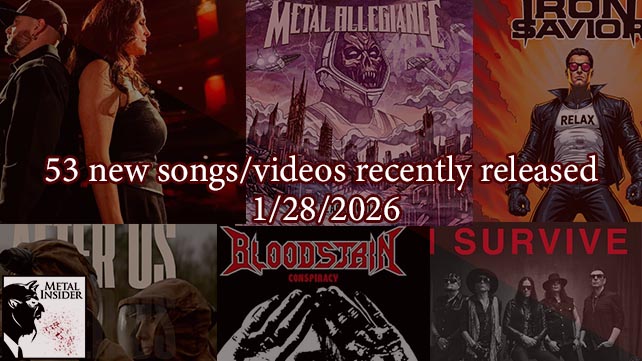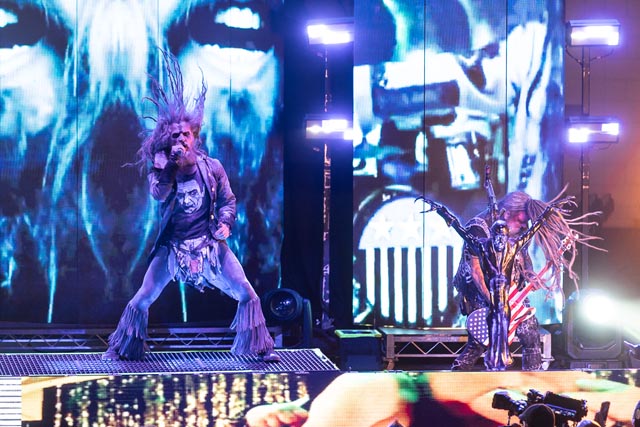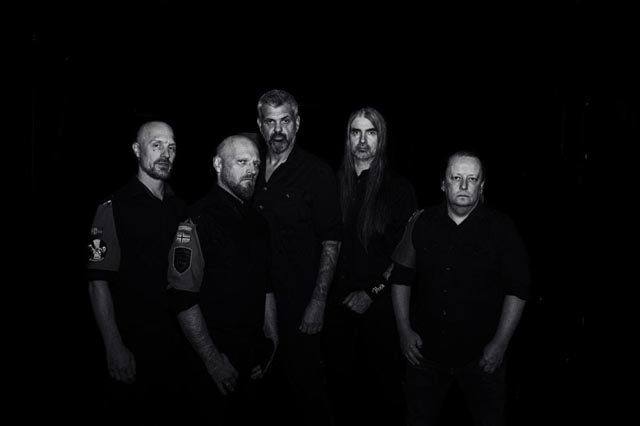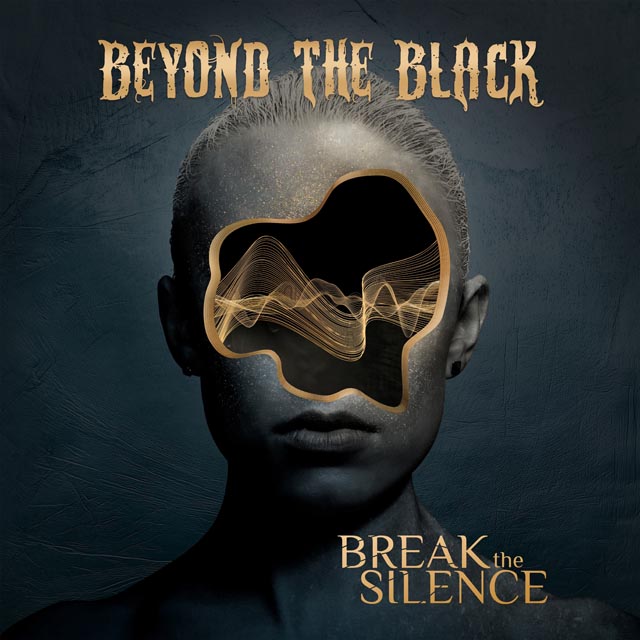Jason McMaster goes through the Broken Teeth discography one by one, at the beginning of a conversation surrounding his band’s eighth overall effort, 4 On the Floor; some titles perhaps not so quick at the tip of the tongue amid a 20-year career for McMaster’s most enduring project since Dangerous Toys.
“Maybe Broken Teeth is just a bit more proactive,” the vocalist reflects, as opposed to Dangerous Toys, which hasn’t released new material since 1995. “We try not to let a song sit around forever. We’re like, it we have a new song, let’s roll! Sometimes, if we need a song, we might revisit an older demo – like “Let The War Machine Roll” on this new album. That was an old song that we revamped and re-wrote the riff for. It almost made it on Viva La Rock Fantastico back in 2010.”
Broken Teeth, once described as an “angry AC/DC,” stays pretty much true to this idealistic description, yet manages to ward off stagnation with 4 On the Floor. Propelled by recent reviews of the new music, which complimented the band through one-liners like “back with more bite than a deep swill of rotgut,” McMaster gave Metal Insider a deep look into his musical world, and how the new tunes were inspired by the most basic of creative exercise.
Of course, the word “prolific” has been used to describe Jason McMaster’s career for a few decades now. The guy’s a certifiable rock legend in his home state of Texas, the Austin-bred maverick having fronted prog-metal legends Watchtower in the early 1980’s prior to Dangerous Toys’ breakout gold-record MTV success in ’89. Since the Toys, he’s juggled original projects like Ignitor, and tribute acts like the Judas Priest show, Sad Wings. There are too many more to mention, so check out Jason’s bio for the rest, but trust us – the guy doesn’t sleep.
Getting back to Broken Teeth, the new 4 On the Floor record is just a bit more of a big deal in that it’s the band’s first offering on the EMP label – the company headed by Megadeth bassist Dave Ellefson and industry insider Thom Hazaert.
“Thom had a label called Corporate Punishment, and we’d talked a while ago about doing something – maybe ten years ago,” McMaster explains of the coupling with EMP. “We were going to do something for Corporate Punishment, but it just never happened. Thom was actually the executive producer of the Dangerous Toys 20th anniversary concert CD and DVD. We didn’t put it out on Corporate Punishment because the label basically went belly-up. When I say that, you might take it to mean going out of business – but he just had to make changes with it. Some changes were necessary.”
McMaster says that when Hazaert and Ellefson joined forces, all parties began discussing collaboration again, deciding it was time to “get back on the same horse together.”
“It was cool that Ellefson was on board,” McMaster admits, “giving it a little star power. Ellefson knows who I am, and obviously I know who he is. We’re not well-acquainted, but we are acquainted. I saw Megadeth on the Killing Is My Business tour in like ‘84/85 – I was doing Watchtower back then. He’s a great bass player, and a great guy.” The new record was all about making the most of the writing sessions – the band capitalized big time on the availability presented to them.
“We set up enough time to hang out at my drummer’s house (Bruce Rivers),” begins McMaster, “and Jared (Tuten), my guitar player, he runs the machine. He produces the records and records the demos – he’s the Wizard of Oz behind Broken Teeth, as far as production and management go. Everybody has hats to wear in this band, and we all get things done. This album, like Bulldozer, came together over a period of a few years. Jared has recently moved from New York back to Austin, Texas, where we’re based. He got married and moved to New York a few years ago but has since moved back. That might tell you how difficult it looked on paper for us to write, but it’s really not – we actually became more prolific for some reason. Jared would be passing through Austin for work-related business, for a week at a time. We’d hang out at Bruce’s house and I’d bring my gear, and we’d write songs.” The sessions turned out to be as organic and “garage,” as McMaster likes to say, as it comes.
“Jared would show me riffs he’s got, then our guitar player David (Beeson) would come over and plug in – we’d make little drum machine demos and shit,” McMaster acknowledges. “ I’d also bring in a stack of old lyrics and song ideas – I’m talking random shit written on napkins, where like a random old lady at the grocery store may have said something in line, and I ran to the car to write it down. So, if we plug in and we’ve got a map of a song – intro, verse, chorus, bridge, solo, double chorus, done, and we have that in an audio form – even if it’s really raw, I’ll plug it into my little gizmo and start going through all this old stuff in my lyric box; I call them “partials,” which are parts of songs or things that just didn’t make the cut. I will literally build a song out of a new riff I’ve just heard a half-hour ago.”
Taking the “band in a box” theory even further, McMaster then loads his recorded ideas onto a thumb drive, walks it across the hall to where Jared Tuten’s studio gear is set up, where Tuten then lifts the vocal and applies it to the basic demo of the song that the band’s fleshed out. “He’ll slice and dice, maybe change the map of the song, until I’ve got a second verse written,” he says. “We can build songs like that all day long. We’ll add some “oohs” and “aahs,” some “do’s” and “don’ts” – it’s like a music factory. Everybody’s really on their game when we do this. It just makes the “garage” part work faster, and I will give credit to the “garage” part of rock ‘n roll, which is where it all begins.”
Broken Teeth still gets their kicks the old-fashioned way – working out the kinks live. They take great pride in being woodshedders. “We still take that demo version and work it up in a live performance vibe,” McMaster proudly tells. “That’s basically where we rent a room; we get in there and rehearse the song, sometimes before it even gets recorded. A drummer can’t really rely on whatever drum machine shit Jared has built to have the right feel that the song needs. We go in and hit record on the iPhone to play it back and see if the right feel is there, and you perfect your craft through these demos before you record it. We’ve even played an entire album of songs out in a live gig before we recorded them, just to make sure it all feels right. There are all these emotions you feel about a song when you’re just trying to get off on it in a live setting.”
Among the balls-out rockers on 4 On the Floor is a track dedicated to the late Lemmy Kilmister titled “Never Dead.” The song contains lyrics, which no doubt, Lemmy would approve – such as “I believe in Motorhead, all the gauges in the red.” It’s easy to envision Lemmy grinding away on this one himself – eyes closed, head cocked up with mic slung south. McMaster, or course, had the chance to tour with Motorhead when Dangerous Toys was included on the Operation Rock ‘n Roll tour in the Summer of 1991, a trek that also included Judas Priest, Alice Cooper, and Metal Church.
“If we had a day off or something, and went to a club, Wurzel (Motorhead guitarist), Lemmy, some crew guys would be hanging out,” McMaster reflects when asked about his run-ins with the legendary Motorhead frontman. “We’d always sit at the table next to him. Lemmy would always stop by our dressing room when he was wired and having fun. There’s even a video I have somewhere of Lemmy and Wurzel in our dressing room, right before we were about to go on, where Lemmy picks up a guitar and we’re kind of banging on a road case, jamming. It was an old song called “Leaving Here” by The Birds – Motorhead covered it at some point. Lemmy was wearing nothing but some Daisy Dukes! He always made us laugh, he was a pretty loveable guy – never gave a shit what anyone thought. Let’s just say that Lemmy didn’t play guitar much – it was a little rough around the edges (laughs).”
McMaster’s acquaintance with Lemmy lasted beyond that tour, in fact. “He actually sent me some lyrics to use for a Dangerous Toys song. So, you can say we wrote a song with Lemmy,” he says. “We demoed the song, but it never actually got recorded to put on an album. I have the lyrics that he wrote for me framed, hanging in my house.” McMaster was able to have Lemmy listen to Dangerous Toys’ demo of the song, much to the chagrin of the hellraiser. One can totally image the scene that McMaster describes next.
“I actually hand-delivered the cassette of the song to a Motorhead rehearsal,” McMaster begins. “Lemmy had a boom box and everything, ready to listen to it. He looks over and says, ‘I wrote this as a 12-bar; what the hell are you doing with this?’ I said, ‘Sorry, Dangerous Toys is not really known for 12-bar blues.’ It may have been a round peg in a square hole, but that’s really how Dangerous Toys kind of did stuff, too.”
The conversation swayed into Dangerous Toys territory, and offering up a bit of praise for arguably the band’s heaviest record, 1994’s Pissed. After a brief reminder of a show the Toys had played in Wilkes-Barre, PA that year (“Was that the show where the P.A. caught on fire and we had to carry it out back?” remembers McMaster), the talk turned to honest assessment of the band’s output.
“I know what you mean about the Pissed record,” McMaster responds to this writer’s compliment. “That record could’ve, and maybe even should’ve, put us back up there. I meet Toys fans all the time who say their favorite record is Hellacious Acres, and for the guys in the band, that’s our least favorite. Not that the songs were bad, but the production lost something from the time it was recorded until the time it was released – something was missing. About half of the record tastes pretty good as far as baking would go, but the other half feels a little undercooked. Pissed, though, has a really cool vibe on all of the songs – it’s a good representation of where we were at the time; where a “cock-rock” band would fit in in 1994.”
What turned out to be Dangerous Toys’ last studio album actually led full circle to Broken Teeth – an important cog in the wheel early on being guitarist Paul Lidel, Dangerous Toys guitarist and former Broken Teeth six-stringer.
“It wasn’t long after Pissed that Paul and I formed Broken Teeth,” recalls McMaster. “He exited Broken Teeth around 2006-7. But, the first few broken Teeth records were basically his guitar talking to the listener. It was me trying to be Bon Scott over the top of his guitar, which was literally emoting something in my lyric and my voice. We were trying to do this thing together, and I think Paul helped Broken Teeth get to 4 On the Floor. I’ve read some reviews of this album where people are emotionally correct in saying that ‘this sounds like their early stuff.’ I would say now that the band is better – it’s tighter, it’s less raunchy and more angry-sounding to me now.”
Both Dangerous Toys and Broken Teeth were conceived in one of the most fertile birthing grounds for music in the United States – Austin, Texas. Long the industry choice to host the mammoth South By Southwest conference each year, Austin certainly has an aura around it, especially when it comes to live music. As one of the pillars of the Austin music community, how does McMaster feel about the spotlight shining upon his hometown every year?
“As someone who has been here since the SXSW inception, I’ll give you a nutshell of personal feelings – no holds barred,” he begins, “and some things I should probably keep to myself – I’ll start with the positive. Is SXSW healthy for the city? God yes! It makes the city millions of dollars every year – when you think of almost 30 years of SXSW, it’s amazing to think of how much money the city has made. The festival started as a three-day music and arts festival with a string of clubs around town hanging banners, probably free admission, trying to get industry people to see how great the local talent was; what a hotbed it was turning out to be. The town was already a hotbed – Willie Nelson claims to be from here, Charlie Sexton from Bob Dylan’s band, Stevie Ray Vaughan; he’s from Dallas but everybody thinks he’s from here. He did come here and create his world here, and the list goes on and on.”
Dangerous Toys actually got discovered at SXSW in March of 1988, a still-buzzing time for the conference, according to McMaster. It’s a great story of a rep from publishing company SBK coming to the first SXSW in ’87 and seeing a band called Onyx, which featured a few future Dangerous Toys members. By ’88, McMaster was now fronting Onyx, now named Dangerous Toys. The rep came to check out Onyx again in ‘88, now finding this new band, and things only blossomed from there. The rock ‘n roll lore wouldn’t always appear to be quite so promising, though.
“Fast forward to right now, and think about all 30 years of technology,” he offers. “30 years of how people buy music and watch movies, and all of that. It’s been this way for about 15 years now, but SXSW is a trade show now. It’s not about Austin music, it’s not about the little guy, and it’s not about dreams. It’s not about a guy writing a song and forming a band and trying to get some help. It’s not an industry person coming in saying, ‘hey man, I like your music, let’s get your song published, give me a call on Monday.’ That doesn’t happen anymore. It’s all Apple products and film festivals like Cannes, Interactive with the products; it’s a trade show.”
McMaster acknowledges that there are still smaller labels and mangers looking out for new music at the conference, but “there are no rock stars anymore.” Brands and products are the new name of the game.“When bands like Metallica started playing at SXSW,” he begins, “Then you ask, ‘why is Metallica playing SXSW?’ Metallica has a new record coming out, so it’s like, ‘hey Metallica – we booked you into SXSW so the industry can hear a few new songs before the record comes out. We have a new Metallica Rock Band game coming out; we’ll do cross-promotion, it’ll be great, sponsored by Monster.’ Welcome to SXSW.”
Just prior to the end of the conversation with Jason McMaster, the subject wandered to the recent passing of Chris Cornell, and if such a devastating loss to the musical community led to any reflection of McMaster’s own musical legacy. His answer was truly universal – surely how most musicians would love to go down among the ages.
“Life is fleeting,” he ponders. “The thing that comes to mind after the loss of someone like Chris Cornell, is my body of work, as far as being an infamous musician/songwriter/performer on any level. You want to be known for the things you have passion for. It’s interesting to think about his body of work and how it made people feel – it’s about how the songs were emotionally charged to make people say, ‘that’s a fucking good song.’ True passion is always going to be there, and just like with Ronnie James Dio – they’re never going to be gone. Unless you’ve had dinner with them every weekend, they’re still here. It does make you reflective, and think about your own mortality.”











